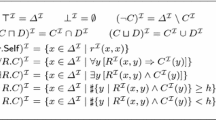Abstract
The Composition Lemma is one of the strongest tools for learning complex classes. It shows that if a class is learnable then composing the class with a class of polynomial number of concepts gives a learnable class. In this paper we extend the Composition Lemma as follows: we show that composing an attribute efficient learnable class with a learnable class with polynomial shatter coefficient gives a learnable class.
This result extends many results in the literature and gives polynomial learning algorithms for new classes.
Preview
Unable to display preview. Download preview PDF.
Similar content being viewed by others
References
Angluin, D.: Queries and Concept Learning. Machine Learning 2, 319–342 (1988)
Auer, P., Kwek, S., Maass, W., Warmuth, M.K.: Learning of Depth Two Neural Networks with Constant Fan-in at the Hidden Nodes. Electronic Colloquium on Computational Complexity (ECCC) 7(55) (2000)
Blum, A.: Rank-r Decision Trees are a Subclass of r-Decision Lists. Inf. Process. Lett. 42(4), 183–185 (1992)
Bshouty, N.H.: A Subexponential Exact Learning Algorithm for DNF Using Equivalence Queries. Inf. Process. Lett. 59(1), 37–39 (1996)
Bshouty, N.H.: A new Composition Theorem for Learning Algorithms. In: Proceedings of the 30th annual ACM Symposium on Theory of Computing (STOC), pp. 583–589 (1998)
Ehrenfeucht, A., Haussler, D.: Learning Decision Trees from Random Examples. Inf. Comput. 82(3), 231–246 (1989)
Kearns, M., Li, M., Pitt, L., Valiant, L.: On the learnability of boolean formulae. In: In Proceeding of the 19th ACM Symposium on the Theory of Computing, pp. 285–294 (1987)
Klivans, A.R., Servedio, R.A.: Learning DNF in time \(2^{\tilde O( n^{1/3})}\). J. Comput. Syst. Sci. 68(2), 303–318 (2004)
Littlestone, N.: Learning when irrelevant attributes abound. A new linear-threshold algorithm. Machine Learning 2, 285–318 (1988)
Maass, W., Warmuth, M.K.: Efficienct Learning with Virtual Threshold Gates. Information and Computation 141, 66–83 (1998)
Pitt, L., Warmuth, M.K.: Prediction-preserving reducibility. Journal of Computer and System Science 41(3), 430–467 (1990)
Sauer, N.: On the dencity of families of sets. J. Combinatorial Theory, Ser. A 13, 145–147 (1972)
Tarui, J., Tsukiji, T.: Learning DNF by Approximating Inclusion-Exclusion Formulae. In: IEEE Conference on Computational Complexity, pp. 215–220 (1999)
Valiant, L.G.: A theory of the learnable. Communication of the ACM 27(11) (1984)
Author information
Authors and Affiliations
Editor information
Editors and Affiliations
Rights and permissions
Copyright information
© 2006 Springer-Verlag Berlin Heidelberg
About this paper
Cite this paper
Bshouty, N.H., Mazzawi, H. (2006). Exact Learning Composed Classes with a Small Number of Mistakes. In: Lugosi, G., Simon, H.U. (eds) Learning Theory. COLT 2006. Lecture Notes in Computer Science(), vol 4005. Springer, Berlin, Heidelberg. https://doi.org/10.1007/11776420_17
Download citation
DOI: https://doi.org/10.1007/11776420_17
Publisher Name: Springer, Berlin, Heidelberg
Print ISBN: 978-3-540-35294-5
Online ISBN: 978-3-540-35296-9
eBook Packages: Computer ScienceComputer Science (R0)



